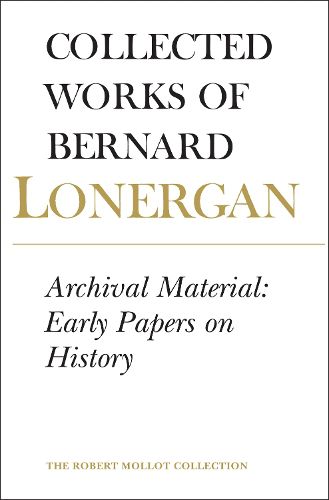Readings Newsletter
Become a Readings Member to make your shopping experience even easier.
Sign in or sign up for free!
You’re not far away from qualifying for FREE standard shipping within Australia
You’ve qualified for FREE standard shipping within Australia
The cart is loading…






In the mid- to late-1930s, while he was a student at the Gregorian University in Rome, Bernard Lonergan wrote a series of eight essays on the philosophy and theology of history. These essays foreshadow a number of the major themes in his life’s work.
The significance of these essays is enormous, not only for an understanding of the later trajectory of Lonergan’s own work but also for the development of a contemporary systematic theology. In an important entry from 1965 in his archival papers, Lonergan wrote that the mediated object of systematics is Geschichte or the history that is lived and written about. In the same entry, he stated that the doctrines that this systematic theology would attempt to understand are focused on redemption. The seeds of such a theology are planted in the current volume, where the formulae that are so pronounced in his later work first appear. Students of Lonergan’s work will find their understanding of his philosophy profoundly affected by the essays in this volume.
$9.00 standard shipping within Australia
FREE standard shipping within Australia for orders over $100.00
Express & International shipping calculated at checkout
In the mid- to late-1930s, while he was a student at the Gregorian University in Rome, Bernard Lonergan wrote a series of eight essays on the philosophy and theology of history. These essays foreshadow a number of the major themes in his life’s work.
The significance of these essays is enormous, not only for an understanding of the later trajectory of Lonergan’s own work but also for the development of a contemporary systematic theology. In an important entry from 1965 in his archival papers, Lonergan wrote that the mediated object of systematics is Geschichte or the history that is lived and written about. In the same entry, he stated that the doctrines that this systematic theology would attempt to understand are focused on redemption. The seeds of such a theology are planted in the current volume, where the formulae that are so pronounced in his later work first appear. Students of Lonergan’s work will find their understanding of his philosophy profoundly affected by the essays in this volume.